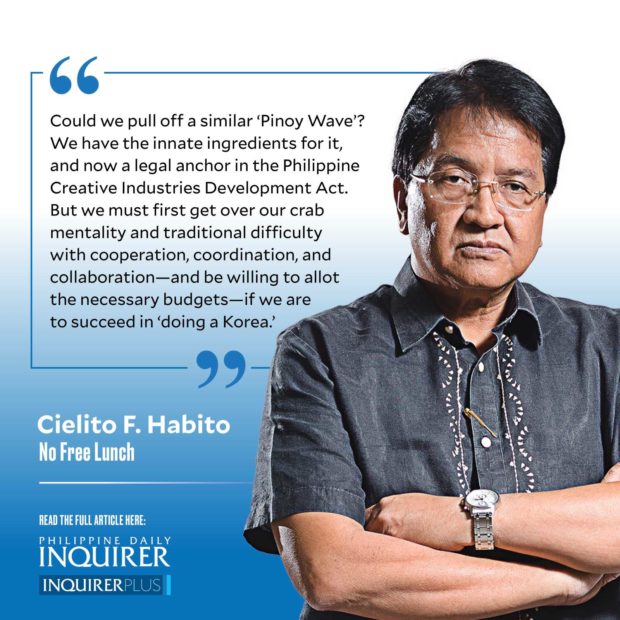Creative lessons from Korea
 It seems hard to believe now, but Filipinos on the average were twice richer than South Koreans back in 1965. Data from countryeconomy.com show average income (GDP per capita) in the Philippines then at $211, and $108 in South Korea. Our total GDP was $6,517 million, more than twice South Korea’s $3,102 million. In 2021, 56 years later, South Korea’s total GDP of $1.798 trillion was 4.6 times our $394 billion. Their average income ($34,744) was nearly ten times ours ($3,576).
It seems hard to believe now, but Filipinos on the average were twice richer than South Koreans back in 1965. Data from countryeconomy.com show average income (GDP per capita) in the Philippines then at $211, and $108 in South Korea. Our total GDP was $6,517 million, more than twice South Korea’s $3,102 million. In 2021, 56 years later, South Korea’s total GDP of $1.798 trillion was 4.6 times our $394 billion. Their average income ($34,744) was nearly ten times ours ($3,576).
Population partly explains the story. We were close to equal then, with theirs at 29.2 million and ours at 32.8 million. Last year, it was 51.8 million and 115.6 million, respectively. While South Korea’s population less than doubled in the last 56 years (it grew by 77.4 percent), ours more than tripled (multiplied 3.4 times)—making us more than twice as numerous as Koreans now. But population aside, they also managed to grow their economy much faster than we did, even with much fewer people propelling it. I’ve written about how Korea’s Saemaul Undong movement primed that country’s rapid economic growth from the 1970s onward (“Spark for rural development,” 5/10/2019). Korean industry giants like Samsung and Hyundai have since turned into household words worldwide.
And now there’s Hallyu or “Korean Wave,” their systematic drive to turn Korean pop culture into a global multibillion dollar earner, which I wrote about two weeks ago. It should inspire us to similarly jockey Filipino talent and creativity into generating great wealth and substantial jobs, and possibly attain the same “soft power” Korea now flexes in the global arena. Coined by Harvard political scientist Joseph Nye, the phrase refers to the ability to influence people’s behavior without coercion (“hard power”)—with culture being a particularly effective tool.
It all started in the wake of the Asian financial crisis of 1997-1998 that nearly flattened the Korean industrial powerhouse driven by its chaebols, their giant diversified conglomerates. The crisis forced the chaebols to divest business units and focus on flagship products, thus opening opportunities for smaller players. “President Kim Dae-jung pushed for information technology and popular culture as the two key drivers for the future Korea,” wrote Danish brand strategist Martin Roll in his account of the rise of Hallyu. “Technology would create new industries above the traditional manufacturing … and popular culture could become an important export product worth billions of dollars—while it would help rebrand Korea.”
And rebrand it did. K-pop music, K-dramas, Korean beauty products, Korean cuisine, and more have captured the hearts and palates of people of all ages around the world and helped the country rise above the image of a crisis-battered economy. And none of it came by accident. The 2020 Oscars win of the Korean film “Parasite” is said to have come after many years of a deliberate drive for the award, pursued through close collaboration among various sectors, and backed with significant government budgets.
Roll listed some of the strategic moves the Korean government made to enable Hallyu: (1) Focused investments in high-tech internet infrastructure, which gave Koreans fast and wide connectivity to the rest of the world, (2) Banning censorship laws that previously curbed creative independence of movie makers and other artists, which unleashed a wide range of topics for them to explore, (3) Emphasis on quality, design, marketing, and branding on a global scale, which increased the Koreans’ collective urge to improve overall quality to provide superior goods to the world market, and (4) Government investment in startups through venture capital schemes, with a major part going to the entertainment industry, which gave the needed push to gain industry momentum.
Could we pull off a similar “Pinoy Wave”? We have the innate ingredients for it, and now a legal anchor in the Philippine Creative Industries Development Act. But we must first get over our crab mentality and traditional difficulty with cooperation, coordination, and collaboration—and be willing to allot the necessary budgets—if we are to succeed in “doing a Korea.”
cielito.habito@gmail.com
















